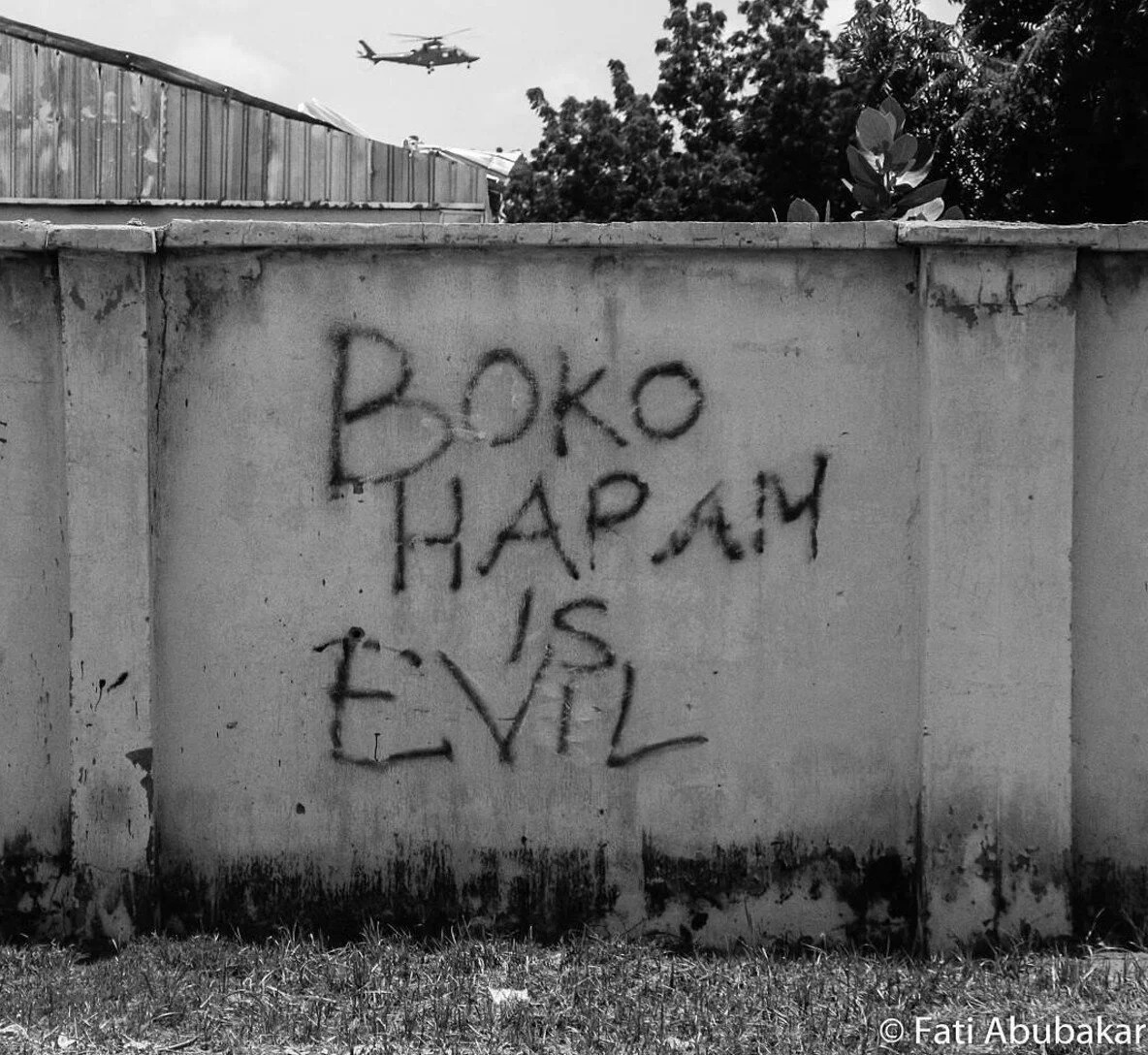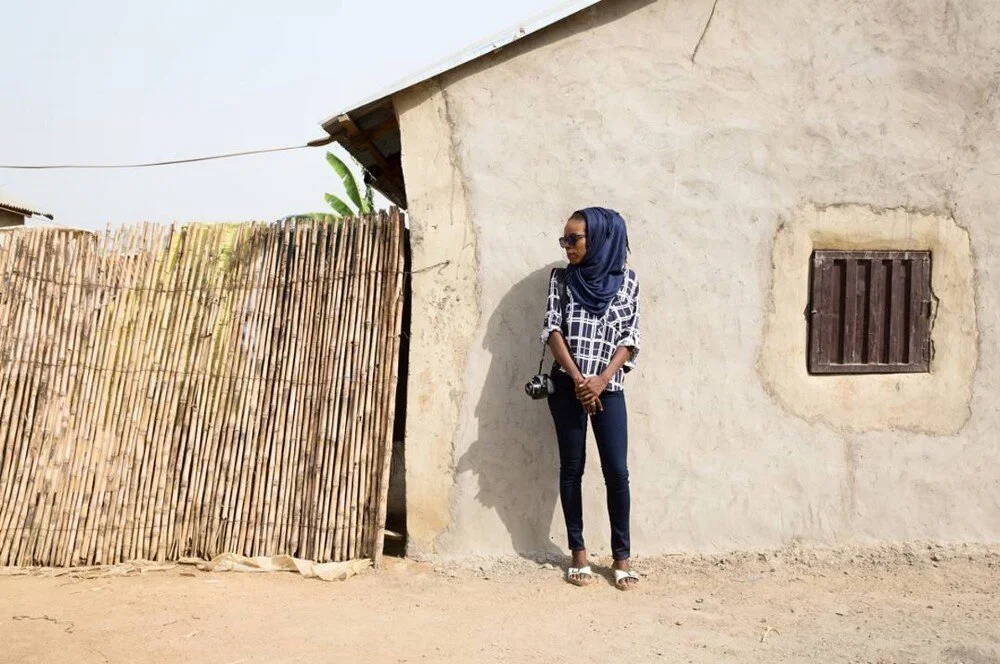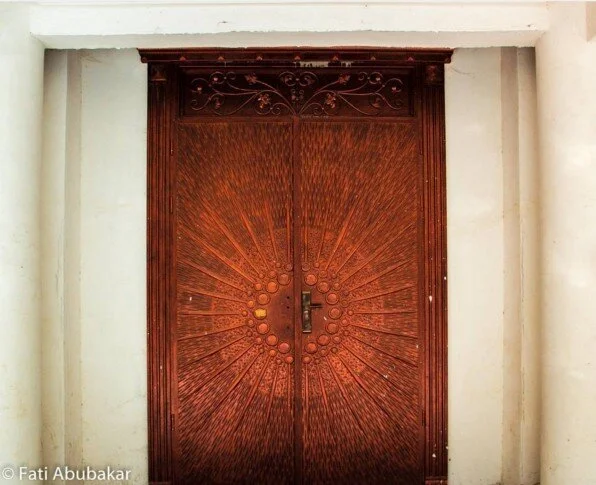More than a tragedy: Photographing resilience in devastation
A message on a wall in Bama. Photo by Fati Abubakar
In 2014 when Boko Haram was at the height of its insurgency in northeastern Nigeria, Fati Abubakar was struggling with the guilt of studying abroad in London while militants gruesomely terrorized her hometown of Maiduguri in Borno state, the birthplace of the Islamic militant group. Wandering through the city’s museums — where she stumbled upon Richard Sandler’s documentary photographing New York in the ‘80s — she found her answer in photography and bought a camera.
Photo of Fati Abubakar taken by Tom Saater
Having studied public health as a nurse, Fati was doing research on the impact of psychological health of refugees. So, instead of photographing the devastation of the Boko Haram insurgency when she returned home, she focused on resilience.
“[The media] just group everybody as being traumatized. But there are people that can bounce back and can become resilient. If that adversity hadn’t happened to them, they wouldn’t be as strong as they could be,” said Fati.
At first she photographed buildings, given the fact that Boko Haram would leave bombed, burnt and defaced buildings in their wake. It was her way of not only preserving their existence but also a feeling of nostalgia and memory. From there she focused on what bomb blasts left behind — the families, the children, and in many ways, the ability to rebuild, heal and move forward.
“‘I was in the UK in 1985', said the engineer building the mosque in the Shehu’s vicinity. And I knew we were in good hands. Well traveled and well educated individuals are what Borno needs to help rebuild our beloved hometown. Here, a beautiful Middle eastern door graces the entrance.”
“The mosque that sits next to the Shehu of Borno’s palace has been under construction for years. But the transformation currently going on is incredible. It promises to be a beauty. To rival other mosques around Nigeria. Here, Middle Eastern windows glow in the sun.”
“Spotted: A colorful furniture shop. Businesses still open.”
“Balu, a Kanuri girl from Alakaramti in Jere local government, is excited about being the center of attention.”
“Girls just wanna have fun. [Little girls at Muna IDP camp during Eid].” Photos by Fati Abubakar
Fati said she was exhausted with the narrative of trauma and the issue of Internally Displaced Persons (IDP) that was portrayed by the media, so she decided to focus on daily life images instead, which she started publishing on Instagram through Bits of Borno.
“We are being stereotyped based on one tragedy, and I personally felt it is crucial to tell as many different sides as possible. Nigeria has always been in the news for everything else but the good. There are definitely bad things about every country, but it is very important to also document the good so that you can have a balanced story,” said Fati.
Though one might think photographing along the streets would be easy for a Muslim woman from Maiduguri, Fati was met with many cultural and religious challenges.
“Our sincere and heartfelt condolences to the Nigerian Army and Nigeria as a whole on the death of unquestionably courageous men who have been fighting Boko Haram in the battle field. There are no words to describe the role of the Nigerian Army in this insurgency. They have been fighters, teachers, protectors and heroes. On this day, as the funeral for the fallen soldiers continue, we mourn with all Nigerians.”
“Twinning.” Photos by Fati Abubakar
“First, [photography] is not considered a profession. Second, it’s a ‘man’s job.’ And third, you are a Kanuri woman who is expected to be married. So, everyone thought I was just aimlessly wandering and they didn’t understand what I was doing. Also, in terms of religion, people in my community feel a Muslim girl shouldn’t be as free spirited and as adventurous as I am,” said Fati.
A boy stands next to a make shift home made of cloth in Gambaru Ngala road informal IDP camp.
“A little boy in Muna IDP informal camp during Eid. Balloons during Eid celebrations are almost a tradition in Maiduguri. Once the Eid holidays are near, the sales of balloons and then plastic sun glasses for children sky rocket.”
“Spotted: A boy herder struggling to control his cow [Cattle market, Maiduguri].” Photos by Fati Abubakar
Despite these obstacles, Fati has achieved accolade after accolade. Bits of Borno has been featured in dozens of publications, from France24 and CNN to The New York Times and NPR. Her work has also been exhibited throughout Nigeria and recently in the United States.
“The goal of the project has been to show the world the other side of Borno State — that we are more than the tragedy that has happened to us. I hope the world knows we are everyday people living in a conflict zone but thriving even in the midst of adversity. Our strength is what needs to shine through,” said Fati.
“A truck at the Cattle Market in Maiduguri aptly has ‘No condition is permanent’ painted on it. The insurgency that has plagued Borno seems unending but the hope is evident in everyday life as trade goes on.” Photo by Fati Abubakar
Follow Fati’s work on Instagram at @BitsofBorno and at @FatiAbubakar_. To see more daily life images of Africa, follow @EverydayAfrica.







![“Girls just wanna have fun. [Little girls at Muna IDP camp during Eid].” Photos by Fati Abubakar](https://images.squarespace-cdn.com/content/v1/5a766c60dc2b4a0bdb3d526b/1603139726612-8N5H0467CC7VG3K5VEWL/1_8_jt3H17VjWBgJA6K1gI1w.jpg)




![“Spotted: A boy herder struggling to control his cow [Cattle market, Maiduguri].” Photos by Fati Abubakar](https://images.squarespace-cdn.com/content/v1/5a766c60dc2b4a0bdb3d526b/1603139893010-D8Q4QH5PKCKVE3NLF764/image-asset.jpeg)
